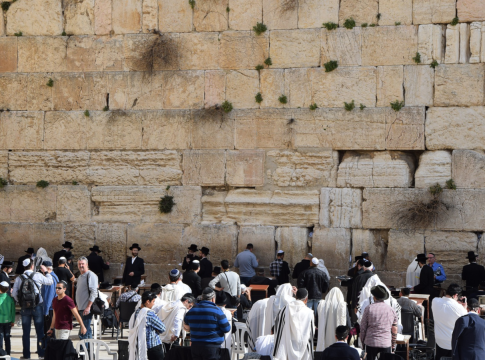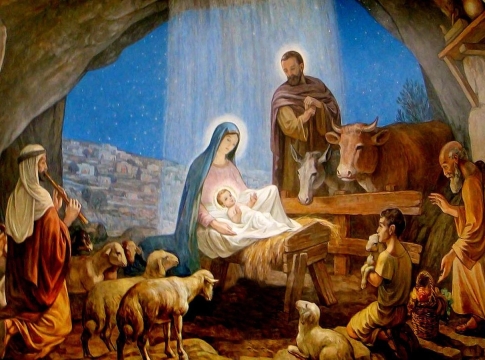
“Jesus, Son of David, have mercy on me!” he started to cry out. Many others chastised him and told him to keep quiet. (Mark 10:47–48)
Jesus on his way to Jerusalem
Just before his death, Jesus traveled to Jerusalem. At the same time, many other people were on their way to Jerusalem to attend the feast of Passover. According to the Gospel of Mark, Jesus was in the middle of a big crowd moving slowly towards the city (Mark 10:1). During their journey, they passed the city of Jericho. On the edge of that town, a blind man tried to catch Jesus’ attention shouting “Jesus, Son of David, have mercy on me!” (Luke 18:35). According to the Gospel of Mark , they came across the blind man when they left Jericho (Mark 10:46). Moreover, according to the Gospel of Matthew (20:29-30), there were two blind men. Anyhow, many people got quite upset by the shouting and told the blind to shut up. This article tries to explain what the crowd may have thought hearing the words “Jesus Son of David”.
| Bible verses that mention Jesus as the Son of David
Matthew 1:1; 9:27; 12:23; 15:22; 20:30-31; 21:9; 21:15; 22:42. Mark 10:47-48. Luke 1:32; 18:38-39. |
The Hebrew expressions “sons of” and “son of”
The claim that Jesus is the Son of David implies that King David and Jesus were related as kin. That being said, this does not prove that Jesus’ biological father was David. It is evident from the Gospel of Matthew (Matthew 1:6–16) that Jesus was related to the family of David through Joseph, the spouse of Jesus’ mother Mary. Nevertheless, during a period of almost a millennium, a total of twenty-five generations separated Jesus and David.
The terms “sons of” and “son of” in Hebrew can allude to multigenerational family ties. One could argue, for instance, that the priests serving in the Jerusalem temple are “sons of Aaron” (2 Chronicles 13:9), despite the fact that Aaron, Moses’ brother, died hundreds of years prior. Similar to this, although their common grandfather may have lived centuries ago, certain Levites could be referred to as “the sons of Korah” (Psalm 42:1) and others as “the sons of Asaph” (2 Chronicles 35:15; Ezra 3:10). Similarly, the succeeding kings of Jerusalem may be referred to as “sons of David,” a reference to their common progenitor, King David, who had established Jerusalem as his city long before (2 Chronicles 23:3).
In Hebrew, the expressions “sons of” and “son of” may also indicate that a person belongs to a certain group of people other than a family. So, the common expression “the sons of Israel” refers to all Israelites, family or not. The expression “the son of the foreigner” may refer to any person of the category “foreigner” (Isaiah 56:3). And when Amos states “I am not a prophet nor the son of a prophet”, he not only states that he doesn’t come from a family of prophets, but also that he doesn’t belong to that category (Amos 7:14). Sometimes, Bible translations avoid the expressions “sons of” or “son of”. For example, the expression “the sons of Israel” may be translated as “the people of Israel”, the expression “the son of the foreigner” as “the foreigner”, and the Hebrew expression “the sons of the bridechamber” as “the wedding guests” (Matthew 9:15).
“Jesus the Son of David” refers to more than only Jesus and David’s familial relationship. It also implies that Jesus follows the customs of the Jerusalemite monarchs. And that’s when the Jericho crowd started to become tense. What if the Roman occupiers in Jerusalem were told that someone bearing the title “Son of David” was among the large group of people in route to the city? How would the authorities in Rome respond?
| 27 generations from David to Jesus Matthew 1:6-16 1. David, 2. Rehoboam, 3. Abijah, 4. Asa, 5. Jehoshaphat, 6. Jehoram, 7. Uzziah, 8. Jotham, 9. Ahaz, 10. Hezekiah, 11. Manasseh, 12. Amon, 13. Josiah, 14. Jeconiah 15. Shealtiel, 16. Zerubbabel, 17. Abihud, 18. Eliakim, 19. Azor, 20. Zadok, 21. Akim, 22. Elihud, 23. Eleazar, 24. Matthan, 25. Jacob, 26. Joseph, the husband of Mary, the mother of Jesus. |
The promise of a new king
Jesus had not even been in Jerusalem long before the collapse of the Davidic kingdom. Many individuals were forced into exile, including the royal family, while the city was destroyed. The city and the region around it, known as Judah, were reduced to a tiny province under the control of the major empires that controlled it in turn. It eventually joined the Roman Empire.
The end of the exile period was predicted by several prophets. The exiled people would return. It is true that some returned (Ezra 2; 7). Furthermore, the prophets predicted that one of David’s descendants would restore the kingdom in accordance with an ancient promise (2 Samuel 7:12–16) (Isaiah 9:5–6), Jeremiah 30:18–21, Micah 5:1-4, and Zechariah 6:12–13).
It was waiting for the promise to come true. Strong anticipation existed throughout Jesus’ time that the kingdom would soon be restored (Luke 2:25–26). Some were only scared of what would happen if someone were to usurp King David’s throne, but one blind person saw the promise being fulfilled in Jesus, Son of David.
The Roman mistake during the feast of Passover
We know that in 63 BC, the Roman Empire seized the region known as Judah from non-Biblical sources. It was renamed “Judea.” Judea enjoyed a brief period of autonomy from the Roman government during King Herod the Great’s rule. Shortly after the birth of Jesus (Matthew 2:19), riots occurred in Jerusalem on the occasion of the Feast of Passover following the death of King Herod. In retaliation, the Roman army massacred over 3,000 individuals in the vicinity of the temple. There was tension between the Roman authorities and the Jews until 67 AD, when a large-scale Jewish uprising occurred. In response, the Roman troops destroyed Jerusalem, including the temple.
Jesus traveled throughout Judea, Samaria, and Galilee at a time when hostilities between the Jews and the Roman invaders were intensifying. For fear of reprisals from the Roman troops, the Jews surrounding Jesus were extremely wary of anything that may be misconstrued as rioting or revolt. The blind needed to be stopped right away because shouting “Jesus Son of David!” may be interpreted as a challenge to the Roman government.
But those who recognized Jesus for who He truly was when He was traveling to Jerusalem were the blind people of Jericho. And a few days later, Jesus was crucified in Jerusalem by the Roman authorities.
Conclusion
We covered three facets of the phrase “Jesus the Son of David” in this post.
- First of all, the statement suggests that David was not necessarily Jesus’ biological father but rather an ancestor.
- Second, the phrase suggests that Jesus might be regarded as Jerusalem’s legitimate monarch.
- Thirdly, the phrase suggests that Jesus realized the prophecy that God would restore his kingdom through the advent of a new Davidic monarch.
The locals were reluctant to use the phrase out of concern for the Roman occupiers’ perceptions of a new monarch in Jerusalem. When the blind realized who Jesus truly was, they yelled even more. What say you? How do you respond?





